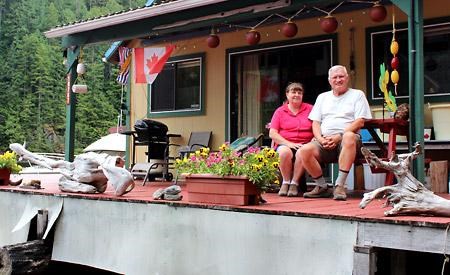For most people in Powell River, up the lake means an occasional trip to a friend’s cabin or a few well-spent weekends in the summer. For Wayne and Margy Lutz, 65 and 63 respectively, up the lake is a way of life.
“We said why not? We could do it,” explained Wayne, who retired early from his job teaching aviation courses in Los Angeles for the peace and calm of Powell Lake. Now the couple lives completely off the grid, relying on alternative sources of power and their own self-sufficiency.
It wasn’t always this way though. During their yearly summer excursions flying their plane, a Piper Arrow, up the coast, the Lutzs used to bypass Powell River in favour of locations farther north. This all changed when the couple was forced to stop in the city for gas—and didn’t leave for two weeks.
“One of the first things we did was fall in love with Powell Lake,” said Wayne. “It was like nothing we’d ever seen because of the floating cabins.” The Lutzs, enamored with the up-the-lake lifestyle, quickly moved to purchase a cabin of their own.
After living in their new home-away-from-home for short periods during holidays, the Lutzs decided to make the full move after they both retired in 2005, going on to become permanent Canadian residents in 2008.
Situated against a sheer rock face in Hole-in-the-Wall and marked by a propane tank painted as an orca, the couple’s cabin resembles many of the more than 200 others on the lake, but for the Lutzs it represents an exercise in self-sufficiency marked by a sharp learning curve.
“Here we were, [two people] from Los Angeles who knew nothing about living off the grid,” said Wayne, laughing. “You definitely learn and enjoy doing things that you wouldn’t have done before.” These necessary skill sets include everything from chopping wood to doing basic mechanical and electrical repairs.
Helping the Lutzs along has been John Maithus, the person who built and sold them their cabin. Whenever something went wrong, Maithus helped the Lutzs find a solution. “John has kind of become our savior,” said Wayne. “I don’t know anything about this stuff—but he does and we follow him and learn from him.”
Innovation and repurposing have been essential in the Lutzs’ transition. Like many float cabins, the couple’s dwelling is powered by a mixture of propane and solar panels, but it also makes use of wind turbines and an experimental thermal generator set up near their wood stove. Airplane headsets provide a method of communication while driving the boat and a dinghy that floated in after a storm is now used for firewood storage.
The Lutzs have had to be creative cooks as well. When they first moved in, explained Margy, they only had an RV refrigerator. “You could only have about a half-gallon of milk and a head of lettuce.” Since then, the couple has upgraded to a full-sized fridge, but before the change “I found a lot of substitutions for eggs,” she said.
Aiding in the transition has been Margy’s floating garden, a log barge that floats within the breakwater and can be retrieved by a rope pulley system. “Right now we have onions, potatoes, carrots and strawberries,” she said. A hose attached to a converted bilge pump allows for easy watering.
Other simple touches also work to add a homey feel to the construction. Margy collects pieces of driftwood to use as on-deck decorations and plants flowers in stumps that float around near the back of their breakwater. Also at the back of their breakwater is an area closed off by logs. “It’s our own private swimming pool,” joked Margy.
Another at-home comfort is the couple’s newly installed bathroom, complete with composting toilet and a bathtub that can be filled with water heated on the wood stove. “[The cabin] came with an outhouse, [but it] was four flights of stairs up a big cliff,” said Margy, “so it wasn’t a popular place to go.”
Along with many of the regular cabin complications, the Lutzs deal with a challenge not many cabin owners are familiar with—winter. Storms often leave the couple stranded either at their cabin or in town and have at times been frightening.
Margy still remembers a nasty storm that blew through during her first winter off the grid. “One of the cables [tethering the cabin to shore] broke, and I went flying out,” she explained, recalling how the cabin flew out into the bay, and added that although a tad traumatic, it was an exciting experience. The cables have since been fixed with shock absorbers to prevent more breakage.
Another challenge of the off-season is saving electricity. With the sun only hitting the cabin for between two and four hours a day, “we’re fighting for every little electron,” said Wayne. Because of this, the couple relies heavily on propane and flashlights, as well as a backup gas generator, during the cold season.
Winter does have some benefits though. Minus the distractions of modern-day media, the cabin provides a perfect place for Wayne to write. Wayne has even repurposed an old boat found in someone’s yard as a writer’s retreat, complete with couch and carpet.
“If you give up Internet coverage and TV and stuff, it focuses you as a writer,” he explained. “It gives you no excuses.” Since moving up the lake, Wayne has written a 10-book series focused on his experiences, with the newest, Off the Grid, just hitting stores. The author also dabbles in science fiction—his latest book, Anomaly at Fortune Lake, includes settings and characters inspired by those around the Powell Lake area.
Wayne and Margy agreed that full-time off-the-grid living isn’t for everyone, but the couple enjoys the simplicity it brings to their everyday activities. “It’s more of a basic life,” said Margy. “It comes down to the simple things that you enjoy, like cutting wood and growing vegetables and having the time to do all that.”



